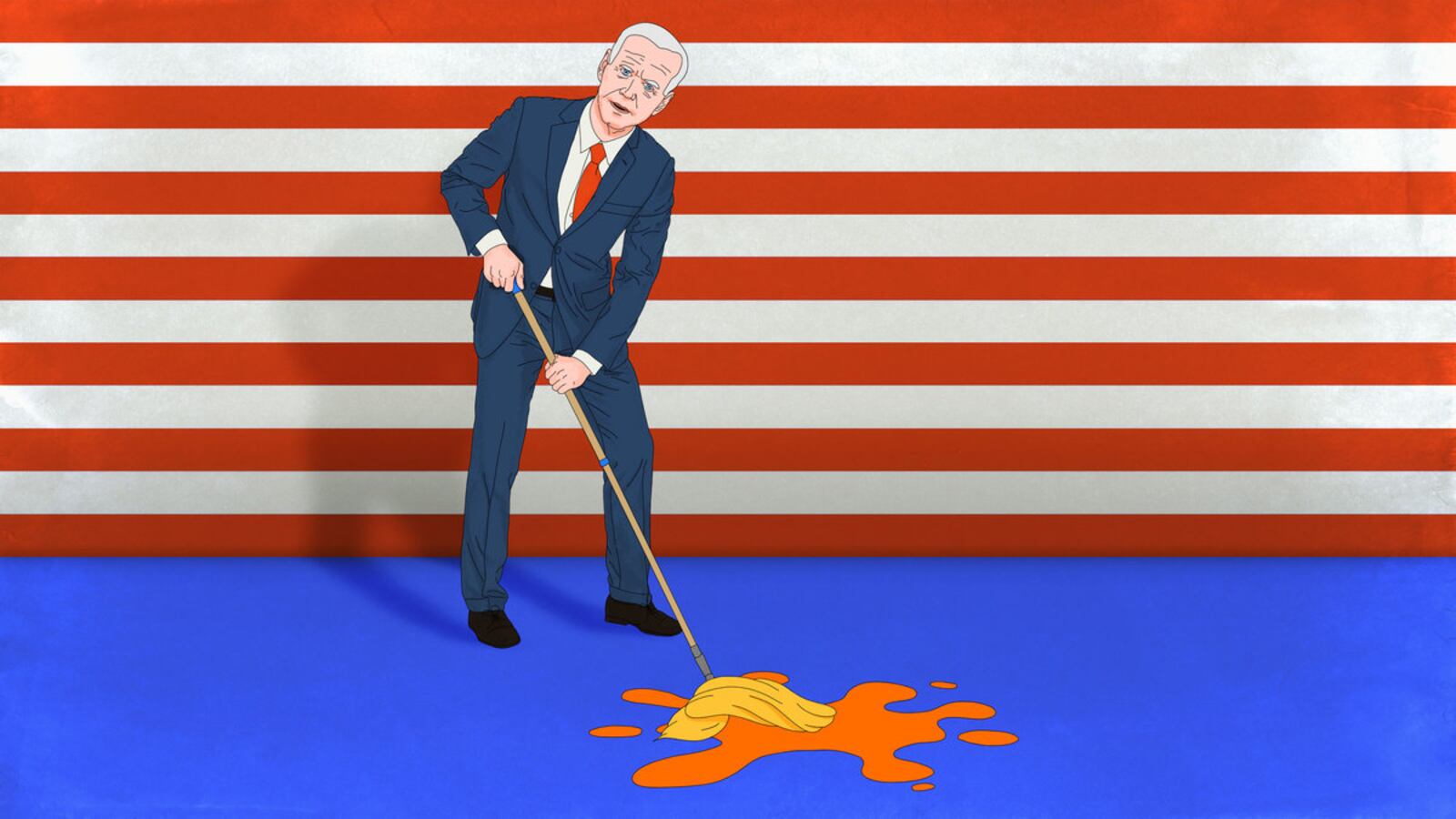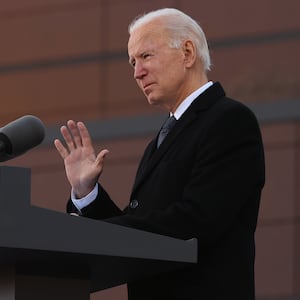Barack Obama delivering a barn-burning closing address in the pouring rain. A friendly sparrow alighting on Bernie Sanders’ lectern. A fly combing through Mike Pence’s hair as he defends his boss against charges of cozying up with white supremacists.
Political history loves a metaphor, and there may be no powerful symbol of the challenge facing President-elect Joe Biden than his taking the oath of office on Wednesday amidst the literal American carnage wrought by his predecessor, standing atop a stage just recently overrun by a mob willing to burn down the Capitol so long as President Donald Trump remained king of the ashes.
Biden’s most pressing task: start sweeping up the ashes.
His first address to the nation as its president will focus on bringing the nation back together during a moment marked by unprecedented crisis, according to Biden advisers. The theme—“unity”—is simple, but the country he seeks to unify is fractured along every conceivable axis, as is the government he will lead.
Biden’s call for a return to cooperation in the face of crisis is not new. On the campaign trail, the former vice president finished nearly every stump speech by reminding supporters that “there is nothing this country cannot do when we do it together.”
The president-elect prefaced that message of healing on Tuesday night during a memorial for the 400,000 Americans who have died during the COVID-19 pandemic.
“To heal, we must remember, and it is hard sometimes to remember, but that’s how we heal,” Biden said at the Lincoln Memorial Reflecting Pool. “It is so important to do that as a nation.”
But before Biden even takes the oath of office at noon, his hand on a five-inch thick family Bible that dates back to the 1890s, the forces of discord are already gathering strength. Sens. Josh Hawley (R-MO) and Tom Cotton (R-AR) are already thwarting Biden’s hopes of quickly confirming key intelligence and defense officials, a process already slowed by the impending impeachment trial of Biden’s predecessor, who sulkily departed Washington for his seaside lair hours before the inaugural address. Or, as incoming White House chief of staff Ron Klain succinctly summed it up to CNN’s Jake Tapper on Sunday: “We’re inheriting a huge mess here.”
Klain was speaking specifically about the anemic rollout of the coronavirus vaccine but, frankly, was also describing any number of public health, economic, political, and moral crises facing the nation.
“But,” he promised, “we have a plan to fix it.”
Biden’s transition has in recent days laid out the schematics of an intricate plan to systematically dismantle as much of Trump’s legacy as possible—reversing the “Muslim Ban,” re-joining the Paris Climate Agreement, and instituting a nationwide mask mandate on federal property. That’s just on the first day, when the president intends to sign 17 executive orders, many of them aimed at cleaning up the previous administration’s mess.
But the president-elect and those around him are deeply aware of the risks that come with defining a presidency by how well one is able to undo a previous president’s legacy.
“It’s borderline funny, given, like, everything, but when President Obama took over after George W. Bush, people were convinced that Obama’s entire agenda was going to be taken up by the simple matter of undoing the second Bush administration,” said a former staffer in Biden’s Senate and vice presidential offices who declined to be named because they’re hoping to land a spot in the incoming administration. “Now, just as then, the incoming Democratic president is inheriting an economic shitshow, a civil service that’s been bled dry by exhaustion and hostility to adult opinion, and a crisis of faith in the ability of government to make things anything but worse.”
“Trump almost brought the ship down,” the former staffer concluded. “But the Biden administration’s entire legacy can’t just be charting a course that wouldn’t have hit the iceberg.”
The staffer pointed to the Obama administration’s passage of the Affordable Care Act as an example of “dream big” goals, bigger than simply tidying the wreckage of the previous administration. But the ACA’s passage relied on Biden’s much-emphasized ability, as a longtime former senator, to make inroads with congressional Republicans.
On the policy front, Biden appears to be ahead of the game, at least in corralling the various ideological constituencies within the Democratic Party. His $1.9 trillion stimulus proposal to address the coronavirus pandemic and the economic disaster left in its wake has won praise from both establishment Democrats—House Majority Leader Steny Hoyer (D-MD) called it “the groundwork for our economy to build back better, stronger, and more resilient than it was before—and the progressive left—Sen. Elizabeth Warren (D-MA) praised it as “full of many things I’ve been fighting for.”
As for the team required to actually enact what might be called “the Great Dismantling,” the incoming administration is far behind track. Despite calls to confirm nominees to lead top security-related Cabinet departments—calls that grew much more urgent after the attack on the Capitol—Biden will enter office without any Senate-confirmed Cabinet officials, and no guarantee that the Senate will be able to “bifurcate” those confirmation hearings with its impeachment duties.
Yes, impeachment of his predecessor will stretch into Biden’s term—the Trumpian equivalent of cackling vengeance from beyond the grave. Tugged between his campaign promise to heal the nation and what those close to him say is a duty to hold Trump accountable for, well, everything, will be the most high-profile iteration of a balancing act that Biden has performed for most of his political lifetime: striving to build consensus between a Democratic Party that shifted further to the left even as he campaigned for the White House and a Republican Party that largely refuses to view his election as legitimate.
“As a candidate for president, he’s been able to bring the broad coalitions that make up the Democratic Party,” Delaware state Sen. Darius Brown, a former project assistant in Biden’s Senate office, told The Daily Beast. “And for the Republicans, you know, this too shall pass. This immediate period of time shall pass. On January 20th, President-elect Joe Biden will be sworn in as 46th president of the United States, Donald Trump will be off the scene, out of the White House, and I truly believe a new level of civility will be able to be reestablished in the relationship between the White House and the Congress, because of him.”
Biden has been confident that Republicans will emerge from a four-year fugue ready to address the crises facing the nation, once predicting that they would have an “epiphany” after Trump lost the election. But conservatives in Congress appear more interested in letting bygones be bygones when it comes to impeachment of the last president than agreeing to work with the new one, particularly as Democrats seek accountability for the Trump administration’s actions not just from the 45th president himself, but from those who facilitated his actions while in office.
On one side, Biden faces calls to pardon Trump from former FBI director James Comey, or to forgive and forget in the name of “healing” from congressional Republicans like Sens. Marco Rubio of Florida and Lindsey Graham of South Carolina. On the other, he’s being increasingly squeezed to openly support censuring or expelling Republicans who they feel incited the attack on the Capitol by supporting Trump’s bankrupt claims of election fraud, or publicly supporting Trump’s conviction in a Senate impeachment trial after his term has expired.
Biden has not been as conciliatory as some might fear—he’s ruled out a pardon for his predecessor—but both he and Vice President-elect Kamala Harris have dodged the impeachment issue, leaving it up to Congress to decide Trump’s fate.
“Maybe he doesn’t have to go after him,” mused a former campaign adviser. “Think about it: Trump will be a pariah, under investigation by prosecutors and law enforcement around the country, his business weakened and his reputation radioactive among all but the kinds of people willing to storm the U.S. Capitol in his name.”






